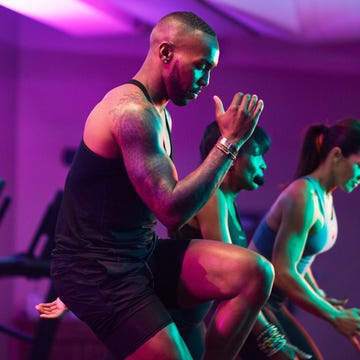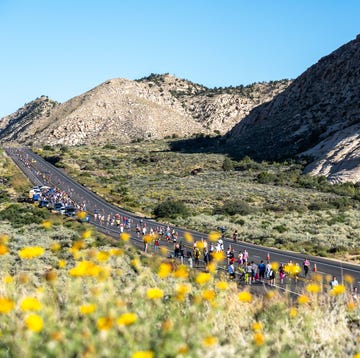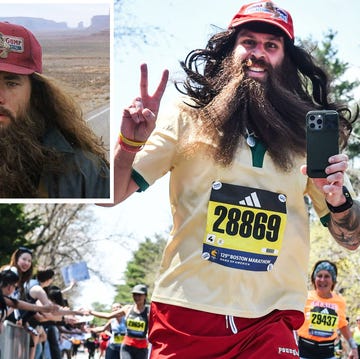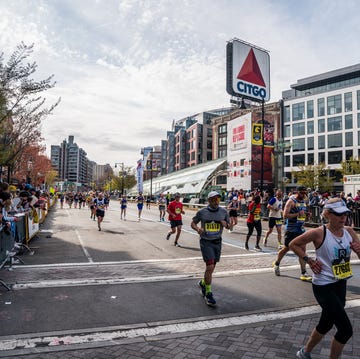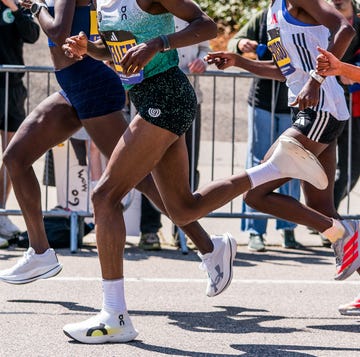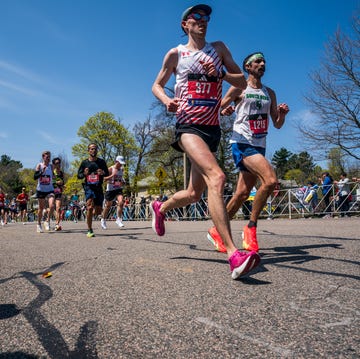In the weeks leading up to the Boston Marathon, there’s a question that can be heard in running clubs and group chats across the country.
“Have you looked yet?”
The weather on Marathon Monday, each year, is always a bonding topic.
It’s often the first thing people will bring up when they find out you’re participating in the race. The spring weather in New England can be unpredictable. It may be 70 degrees and sunny one day and cold and rainy the next. And because Boston is a point-to-point course, there can be a noticeable headwind or tailwind. Geoffrey Mutai, for example, set the men’s course record of 2:03:02 thanks to 21 mph winds from the west in 2011.
Des Linden is familiar with the erratic nature of the Boston Marathon. She’s raced the event 11 times and won the 2018 edition in terrible conditions: a torrential downpour, temperatures in the 30s. Some of her best races have come in tough conditions.
So how often is she checking the weather in the weeks before Boston?
“Not at all,” she said at the pre-race press conference on Friday. “I’ll probably look on Sunday.”
For Linden, she doesn’t see a point in predicting the unpredictable. But that’s not to say it doesn’t affect runners differently. “I think [the weather] will matter on race day,” she said. “I just think it changes so much it’s not a thing that I want to stress about because you can’t control it.”
Linden, though, is an outlier among pros.
Hellen Obiri—the winner the last two years at Boston—checks the weather about two weeks before the race to compare it to previous years. She prefers it to be warm. Even last year, where the temperatures climbed into the 60s by the time she finished, the conditions were cooler than she likes it. (She doesn’t like rain, either.)
Obiri’s coach, Dathan Ritzenhein, who placed seventh at Boston in 2015, is obsessive about checking the forecast, especially if the conditions look harsh. About a week-and-a-half before race day, he constantly checks each day. “Little things matter in the marathon,” he said.
This year, Monday’s forecast is predicted to be around 50 degrees when the professionals set off mid-morning and stay in the low 50s. There will likely be partly cloudy skies with mild wind.
That’s perfect for wheelchair racer Daniel Romanchuk, who tries to be cognizant of the conditions ahead of his races. He uses a sticky solution called Klister, which he applies to his gloves to help improve friction, but it’s affected by temperature changes. “If it’s too hot, it just basically turns into oil,” he said. “And if it gets too cold, it will just kind of solidify and you really won’t get any grip.”
Clayton Young, an Olympian for the U.S. at last summer’s Paris Games, is running Boston for the first time. He first started looking at the forecast 10 days before race day, when 2:10 marathoner Reed Fischer jokingly posted on Instagram: “Happy ‘It’s Still Too Early, Don’t Check Boston’s Extended Forecast’ Day to all who celebrate!”
Sara Hall, on the other hand, forced herself to delete all the weather apps on her phone. She knows the forecast often isn’t accurate until about two days before but she admits she sometimes has a moment of weakness and peeks at the outlook on Google.
“I just can’t help myself.”
Which websites do pros trust?
If there’s one thing that professional athletes agree on, it’s to avoid one specific app.
“I’ve learned to not trust the Apple weather,” Jess McClain said. “It’s always different.”
Hall doesn’t trust it either—she prefers WeatherBug—and McClain opts for Weather.com, although she doesn’t put too much stock into the forecast.
“I think I checked the weather more for my wedding than the marathon,” McClain said on Friday. (It was 92 degrees when she tied the knot outside of Phoenix, Arizona.)
Multiple elites use Weather Underground. Young thinks it’s the most accurate and it shows “all the metrics” throughout a week and Gabi Rooker likes it as well.
Ritzenhein checks, well, a bit of everything. He looks at AccuWeather, Weather.com, Weather Underground, and the Apple weather app (even though he, too, admits it can be be inaccurate).
When Linden finally does check the forecast, she pulls up AccuWeather. She advises Boston runners to check the conditions not only at the start and finish, but at each town along the point-to-point route.
Theo Kahler is the news editor at Runner’s World. He’s a former all-conference collegiate runner at Winthrop University, and he received his master’s degree in liberal arts studies from Wake Forest University, where he was a member of one of the top distance-running teams in the NCAA. Kahler has reported on the ground at major events such as the Paris Olympics, U.S. Olympic Trials, New York City Marathon, and Boston Marathon. He’s run 14:20 in the 5K, 1:05:36 in the half marathon, and enjoys spotting tracks from the sky on airplanes. (Look for colorful ovals around football fields.)




